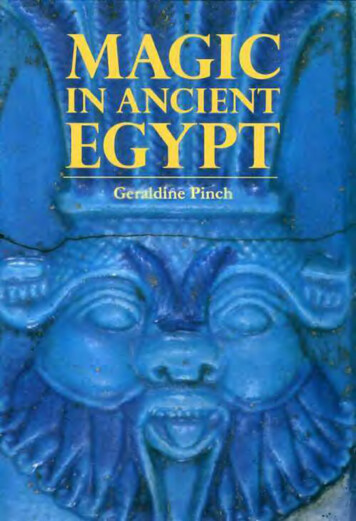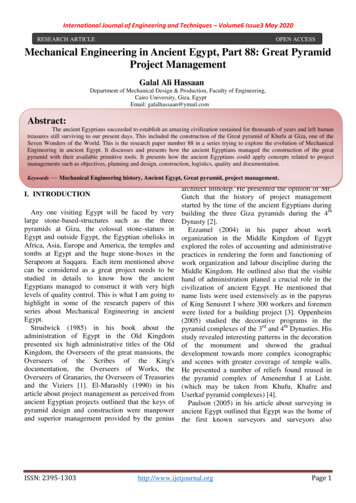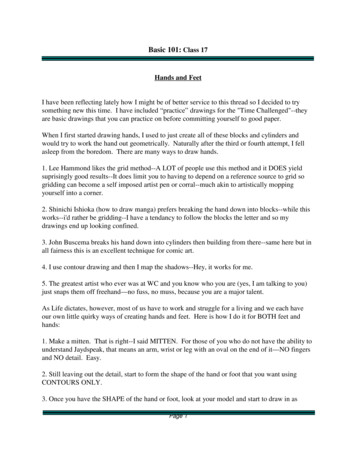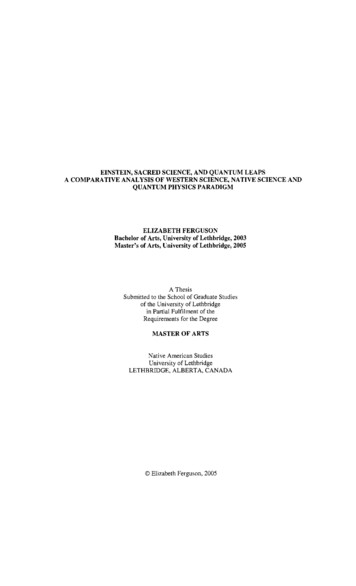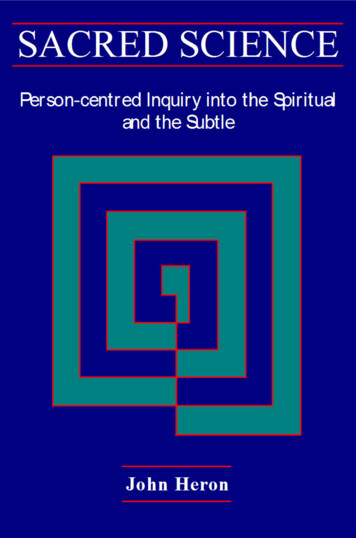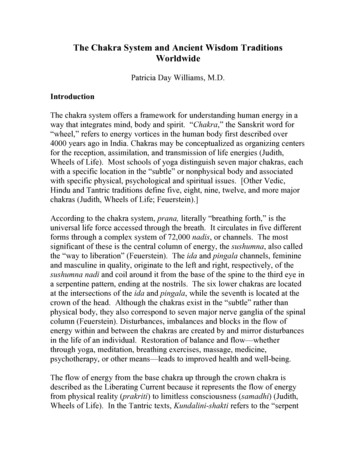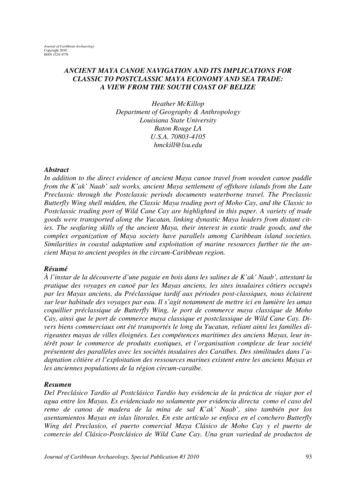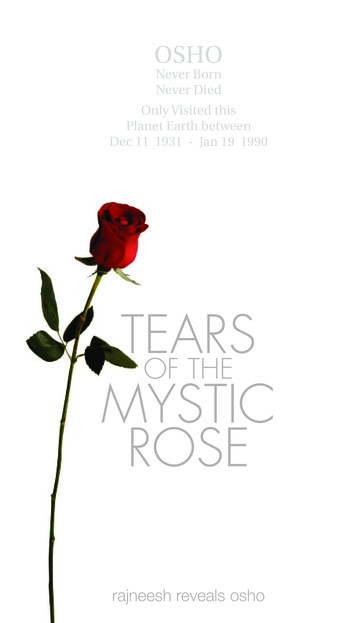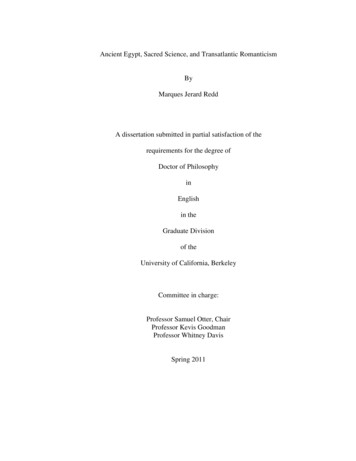
Transcription
Ancient Egypt, Sacred Science, and Transatlantic RomanticismByMarques Jerard ReddA dissertation submitted in partial satisfaction of therequirements for the degree ofDoctor of PhilosophyinEnglishin theGraduate Divisionof theUniversity of California, BerkeleyCommittee in charge:Professor Samuel Otter, ChairProfessor Kevis GoodmanProfessor Whitney DavisSpring 2011
Ancient Egypt, Sacred Science, and Transatlantic Romanticism 2011by Marques Jerard Redd
AbstractAncient Egypt, Sacred Science, and Transatlantic RomanticismbyMarques Jerard ReddDoctor of Philosophy in EnglishUniversity of California, BerkeleyProfessor Samuel Otter, ChairAncient Egyptian culture has been a powerful influence on a major tradition of Englishliterature that runs from Edmund Spenser‘s The Faerie Queene (1596), one of whosemajor iconographic centers is the temple of Isis, to John Crowley‘s four-volume novelÆgypt (2007). My dissertation focuses on the Romantic period – the midpoint of thistrajectory – because it is an extremely intense moment of this influence. In addition tothe visions of Egypt presented in the Bible, Greco-Roman writers, and travel narratives,ancient Egypt reached American and British culture of the time through a variety ofchannels, such as (1) Napoleon‘s invasion of Egypt in 1798, which allowed a stream ofEgyptian monuments to travel into Europe and America; (2) the deciphering of thehieroglyphics in 1822; (3) an Egyptian-inspired freemasonry, which wielded a majoreffect on political revolutions in the USA, France, and Haiti; and (4) revived interest inheterodox Alexandrian traditions such as alchemy, gnosticism, and hermeticism. Thesechannels transmitted a mediated Egyptian ―sacred science,‖ which can be defined as atransdisciplinary form of knowledge that does not aim to study external objects ormanipulate abstract signs and empirical processes, but rather strives to the catalyze thetransformation and expansion of consciousness itself, with the final goal being thedivinization of the human. This project explores the work of a series of canonical Britishand American Romantic figures most deeply engaged with this legacy of ancient Egypt.In interlinked chapters on Samuel Taylor Coleridge‘s Ode on Astronomy, Kubla Khan,and Rime of the Ancient Mariner, Walt Whitman‘s Leaves of Grass, and HermanMelville‘s Moby-Dick, I argue that Egyptian sacred science provided a conceptualfoundation for spiritualized representations of, respectively, the natural world, the self,and deific powers (or ―gods‖) that link these two domains and situate them within anetwork of larger cosmic dynamics.1
Introduction:Does a Theory of Literature Need Egyptology?I begin with a passage taken from the Corpus Hermeticum, a second and thirdcentury CE Alexandrian collation of Greek and Latin texts that were attributed to HermesTrismegistus, the ―thrice-great Hermes,‖ whom the ancient Egyptians knew as Thoth, thewisest of the gods. In the dialogue Asclepius found in this anthology, HermesTrismegistus provides an exposition on the nature of cosmology and hence, on the natureof God, time, and the cycles of life. In the midst of these thoughts, he boldly describes tohis pupil Asclepius the symbolic significance of Egypt in the spiritual history of theworld:Do you not know, Asclepius, that Egypt is an image of heaven, or, tospeak more exactly, in Egypt all the operations of the powers which ruleand work in heaven have been transferred to earth below? Nay, it shouldrather be said that the whole Kosmos dwells in this our land as in itssanctuary.1In ancient Egypt, it was believed that temple ritual not only mirrored, but sustained theworkings of the heavens. The successful implementation of traditional rites insured thesuccess of celestial causes on terrestrial effects, or in other words the bringing down ofheaven to earth. Furthermore, Egypt is constructed as the temple of the world becausethe gods (or hypostatizations of these celestial powers) lived there. This excerpt is not afanciful proclamation of ethnocentrism. Hermes Trismegistus says these words by wayof introducing a prophecy, which falls into two parts.First, he tells Asclepius that a time will come when Egypt, the ―sanctuary‖ ortemple of the Kosmos, will be left desolate. A grand apocalyptic scenario is spun asHermes Trismegistus somberly states that ―men will be weary of life, and they will ceaseto think the universe worthy of reverent wonder and of worship.‖2 The gods will departfrom humankind, presaging a state where ―darkness will be preferred to life.‖3Destruction abounds everywhere as the world itself becomes shaken – soil turns barren,the very air sickens and stagnates, and old age comes upon the world.However, the prophecy contains a subsequent moment of redemption. When allthis has come to pass, says Trismegistus, through an act of grace there will be a renewalof human consciousness of the sacred. Wonder and reverence will once again fill humanhearts. There will be a general reawakening to the divine, which will cause humanbeings once more to sing unceasing hymns of praise and blessing. This will amount to anew birth of the Kosmos, ―a holy and awe-striking restoration of all nature.‖4The idea of a vast cosmic cycle, within which Egypt has a special symbolicimportance, is presented here. As the temple of the Kosmos, ancient Egypt arguablycrystallized in itself a peak of human spiritual attainment and relatedness to nature thathas become a crucial part of Western cultural memory and the unfolding of this tradition.1Walter Scott, trans., Hermetica Part 1: The Ancient Greek and Latin Writings Which Contain Religious orPhilosophic Teachings Ascribed to Hermes Trismegistus (Montana: Kessinger Publishing, LLC, 1995) 341.2Scott 343.3Scott 343.4Scott 347.1
(This text, I should emphasize, was written in Latin.) Yet at the same time, thisprophecy, although ostensibly to do with the fate of Egypt, embraces a larger historicalprocess than simply that of ancient Egyptian civilization, and perhaps Trismegistus‘swords imply that we make a mistake in regarding ―Egypt‖ as belonging to an epochessentially different from our own. Indeed, he seems to be describing, to use aHeidegerrian term, the destiny of the West itself.As we in the contemporary moment so obviously live in a disenchanted, pollutedworld, we might feel inclined to acknowledge that the first part of the prophecy has nowbeen fulfilled: ―Egypt‖ – standing allegorically for humanity and nature – has beendesolated. Though this opening stage has been virtually accomplished, the second stage– the restoration of the temple – seems to be only just beginning. In many respects, thisprocess of redemption was heralded by the Romantic period of literature, which will bethe special focus of this dissertation. Although this is something of a broadgeneralization, to be tempered through the unfolding of the subsequent chapters, theRomantic agenda was deeply informed by this dialectic of dejection and redemption, andthis period sees a concerted effort made to restore a destroyed unity among the self,society, and nature. In a poem such as Samuel Taylor Coleridge‘s Kubla Khan, forexample, the reconstruction of a particular temple of the cosmos – one envisioned withthe help of an Abyssinian maid – is represented as a vital work in progress.In order to harness their imaginative energies for this process of restoration, manyRomantic writers turned to ancient Egypt as a model for spiritual regeneration, especiallythe Egypt linked as above in the hermetic prophecy to notions of liberation, renewal, andideal forms of perception, sensation, and cognition. Inspired by this visionary Egypt,Romantic writers explored modes of transcendental experience that not only entailedtransferring down into earthly spaces ―powers which rule and work in heaven,‖ butraising the human being to the level of divinity. These writers drew upon what can becalled ancient Egypt‘s tradition of ―sacred science‖ to engage in this task. In this project,I analyze how this sacred science influenced in particular the work of Samuel TaylorColeridge, Walt Whitman, and Herman Melville. For the rest of this introduction, I willdistinguish the genealogy presented here from normative intellectual histories, lay out thehistorical background closely linking ancient Egypt and the Romantic period, and give abrief overview of the argument of the dissertation.The Construction of the Western TraditionThe traditional biography of the Western mind has posited that our own era beganwith the Greeks on the one hand, and the Israelites on the other. To simplifytremendously, the Greeks gave us science and reason; the Israelites gave us monotheism.The soul of the West, therefore, was forged by means of a heroic antipathy toward aprevious epoch of irrational superstition and rampant paganism. In literary studiesspecifically, one can see this position taken in Matthew Arnold‘s Culture and Anarchy,which provides a classic statement of this belief: ―Hebraism and Hellenism, – betweenthese two points of influence moves our world. At one time it feels more powerfully theattraction of one of them, at another time of the other; and it ought to be, though it neveris, evenly and happily balanced between them.‖5 In his book The Rise of Eurocentrism:Anatomy of Interpretation, Vassilis Lambropoulos demonstrates how many majoraesthetic positions of the twentieth century fundamentally return to this dialectic,5Matthew Arnold, Culture and Anarchy, ed. Jane Garnett (Oxford University Press: Oxford, 2006) 96.2
including those of Auerbach, Lukacs, Adorno, Levinas, Derrida, and Benjamin, thinkerswhose work still determine the agenda of humanities scholars in important ways.6Turning to the late 20th-century American context, the figure who most forcefullyasserts this paradigm is Harold Bloom. As he says in the introduction to a collection ofessays on Homer‘s The Iliad,[Homer and the Yahwist] compete for the consciousness of Westernnations, and their belated strife may be the largest single factor that makesfor a divided sensibility in the literature and life of the West. For whatmarks the West is its troubled sense that its cognition goes one way, andits spiritual life goes in quite another. We have no ways of thinking thatare not Greek, and yet our morality and religion – outer and inner – findtheir ultimate source in the Hebrew Bible.7This is, however, a picture of our cultural identity that carries less and less convictionwith the passage of time. The complete picture must include the world that the Greeksand Israelites turned away from, as the history of the West is much older than thesenarratives might lead one to believe. Especially in the effort to understand how theRomantic period attempted to reclaim the depth-dimension of the soul, it is necessary toshift our perspective beyond the Judeo-Greek horizon. In so doing, one gains a moreaccurate perspective on the developmental path inexorably taken since those times.In The History of Western Philosophy, Bertrand Russell says, ―Much of whatmakes civilization had already existed for thousands of years in Egypt and inMesopotamia, and had spread thence to neighbouring countries. But certain elements hadbeen lacking until the Greeks supplied them.‖8 Contrary to these types of triumphalistaccounts that see the Greek development of a certain kind of rationalist science andphilosophy as a unique step forward for human thinking, one could argue that the Greeksdid not so much inaugurate a new epoch of science and rationalism as let slip from theirgrasp an older dispensation. It was a dispensation of which the Egyptians were chiefguardians in the ancient world, and according to which knowledge of spiritual powersthat pervade the cosmos was assiduously cultivated and could be used to amplify thebody, life, and existence. As the Greeks slackened the grip upon this older mode ofconsciousness, they had increasingly to orient themselves by reference to the narrowerhuman faculties of logic and sense perception.9In Moses and Monotheism, Sigmund Freud claims that Hebraic monotheismrepresents a ―progress in spirituality‖ because it favors abstract conceptual rather thanlower, immediate sense perception of God, emphasizes the renunciation instead of the6Lambropoulos, The Rise of Eurocentrism (Princeton: Princeton University Press, 1993.)Harold Bloom, ed., Homer’s The Iliad (New York: Chelsea House, 1987) 2-3.8The History of Western Philosophy (New York: Simon and Schuster, 1945) 3.9William Blake rails against relying on these faculties. As he says in ―There is No Natural Religion‖:―Mans perceptions are not bounded by organs of perception. he perceives more than sense (tho‘ ever soacute) can discover‖ [sic] and ―If it were not for the Poetic or Prophetic character. the Philosophic &Experimental would soon be at the ratio of all things & stand still, unable to do other than repeat the samedull round over again‖ [sic]. The Complete Poetry & Prose of William Blake, ed. David Erman (Berkeley:University of California, 1982) 2-3.73
gratification of instinct, and valorizes patriarchy over matriarchy.10 Yet even from thistext, one can derive the counter – that monotheism at its most rigorous is an extremelyascetic, uncompromising, and incomprehensible minimalism that even its originalpractitioners could barely incorporate into their lives (as evidenced by the ―regression‖ toworship of the Golden Calf). Given the ancient polytheistic consensus, it could onlyeffect overwhelming cycles of agonistic violence – which for Freud would include themurder of those who worshipped the calf, the murder of Moses, the erasure of Ikhenaten(Moses‘ monotheist Egyptian precursor) from cultural memory, the murder of Christwhich atones for Moses‘, and the slaying of the primal father (which serves as a rebellionagainst a proto-monotheism).11As Jan Assmann asserts in his book Moses the Egyptian, Europe has always been―haunted‖ by Egypt,
Ancient Egypt, Sacred Science, and Transatlantic Romanticism By Marques Jerard Redd A dissertation submitted in partial satisfaction of the requirements for the degree of Doctor of Philosophy in English in the Graduate Division of the University of California, Berkeley Committee in charge: Professor Samuel Otter, Chair Professor Kevis Goodman Professor Whitney Davis Spring 2011 . Ancient Egypt .
